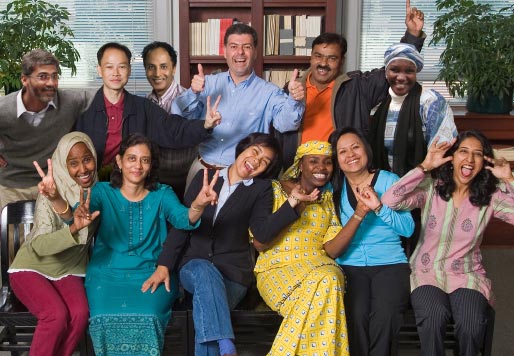I wrote the op-ed piece below to fulfill one of the assignments for my Problems in International Health course with Dr. Steve Gloyd. As many of you know, Dr. Gloyd encouraged us to submit our work to newspapers for publishing. We'd love to post your published/unpublished work on IHP blog too. Please feel free to contact me with any questions on how to do this if you are interested.
Looking forward to reading you. Amineh
Punishing an Entire Population
Following Hamas' takeover of the Gaza Strip last June, Israel tightened its siege over the area to an unprecedented level. Israel declared Gaza a “hostile entity’ in September, threatening to impose economic sanctions against the territory and to further restrict the passage of food, supplies and people. Israel’s policy of collective punishment will only deepen an already dire humanitarian crisis, and lead to grave public health consequences in the most densely populated area in the world.
In late October, Israel commenced its policy of fuel cuts and reduction of Gaza's electricity supply in order to pressure Hamas in response to cross-border rocket attacks. Israel also closed border crossings into Gaza, leaving only one of six entrances open. Since the so-called disengagement in 2005, Israel has been restricting access and controlling borders to Gaza, while denying responsibility for the still-occupied people there.
Sanctions will reduce gasoline imports by about 50% and fuel for Gaza's power plant by 12%. These resources are critical for the livelihood of the already impoverished Strip. Gaza relies on Israel for all its fuel and most of its electricity needs. Fuel is required to produce the electricity that Gaza generates locally. Electricity is needed to pump water and to operate sewage management plants, as well as hospitals and other infrastructure. According to the Humanitarian agency Oxfam International, seven water wells in Gaza City did not operate as usual due to fuel shortage, which decreased the quantity of water supplied to 50,000 people by about 75%. The restrictions on the entry of goods into Gaza have also caused shortage of materials needed for repairs and maintenance of sewage plants. Sewage plants must operate 24 hours per day to prevent sewage floods and spread of disease.
Israel claims that its policy of fuel cuts of up to 15% is a “non-violent” way of increasing pressure on Hamas. An ongoing state of siege that cuts off food, medicines and fuel is not a “non-violent” act. According to the World Health Organization, most of the population is already living under the poverty line, and suffers from malnutrition. Starving civilians as a method of warfare is illegal under article 54 of the Fourth Geneva Convention.
At what expense do we play politics with the health of an entire population?
Our experience with sanctions in the Middle East has taught us that subjecting a population to economic embargo does not work. Such sanctions primarily harm innocent people. Why is this a lesson unlearned? Looking back at the sanctions against Iraq, we know that restricting the imports of medicine and food into the country caused terrible public health consequences. Malnutrition among children became widespread, and according to UNICEF, child mortality tripled in the first year of sanctions. Water-borne infectious diseases such as cholera and typhoid spread and accounted for 50 percent of total deaths among children. 500,000 Iraqi children under age five died due to the economic sanctions in Iraq.
The Israeli siege has severely reduced the flow of fresh food, especially fruits and dairy products into Gaza. Exports are also greatly restricted, resulting in paralysis of the territory's economy. Prices have more than tripled, causing severe hardship for the poorest sector of the population. The unemployment rate now stands at 50%, and poverty has surpassed 85 percent. Critically ill Gazans seeking to leave to receive life-saving medical treatment in Israel or Egypt are trapped within Gaza. Dr. Mustafa Barghouthi, president of the Palestinian Medical Relief Society and former Minister of Information stated that at least ten patients have died since last month because they were denied access to treatment. Such conditions also have serious mental health consequences. The majority of Gazans are suffering from feelings of anxiety, frustration, and hopelessness, according to Dr. Eyad El-Sarraj, president of the Gaza Community Mental Health Program.
The international community should speak out against the deteriorating humanitarian situation in Gaza and hold responsible key players accountable for protection of civilians. Israel should have earnest goodwill at the upcoming peace talks and must fulfill its obligations under international law by lifting the siege on Gaza and opening its borders immediately. The United States would do well to play a more sincere role in peacemaking in the Middle East, and involving other parties who are serious about seeing peace prevail in the region. After all, a genuine and viable peace is the only solution to Israel’s dilemma, not sanctions.




6 comments:
It's too bad that this humanitarian crisis hasn't garnered the attention of Americans enough to motivate them to see past their blind devotion to Israel. Will Gaza have to look more like Darfur? We are supporting and encouraging these sadistic actions-- anyone who has lived in crowded conditions with insufficient water supply would agree that an entity which, at their political whim, pulls the plug on electricity and the drain on clean water to the civilian masses is perpetrating a violent crime on innocent people. Get sick with dysentery and try to argue that dying from it wouldn't be a violent death. I'm sick of hearing sanctions being likened, somehow, to diplomacy. How many more examples of Israeli brutality to we need to witness before we pull the plug and the drain on our support for their cause of racial purity and other zionist aspirations. Enough already. Wake up, it's the 21st century. Land-grabbing zeal and "pure" states are out. Not killing innocent people ("softly" or otherwise) is in. Thank you, Amineh, for your effort to put the focus where it should be.
Great paper Amina!
I have high hopes from the ongoing peace talks bet Abbas and Olmert. I have a feeling that some positive steps will happen in this coming year.
The US, Israel and the Arab states are fearing Iran increasing influence in the region and this Hamas take over was finally a positive event that led to a reinitiation of the frozen peace talks
The strategy of divide and conquer is not new. This time it is conveniently focused on solving "The Palestinian Problem" that is reported to have irritated the global status quo since the 1967 war. But how realistic can it be to isolate and starve Gaza's 1.4 million people? In recent history this approach has been tried in Nazi Germany, Cambodia, Rwanda, Boznia and currently Darfur. Some how I cannot find "Hope" for peace in so blatant a power play.
The real issue for Arabs, Americans and Europeans is farther East around the Gulf of Hormuz. This Bushmanic production (no reference here to my friends on the SW African continent) on the Mediterranean is only a distraction to the conundrum again raging in the cradle of civilization. My hope is that Palestinian peoples do not continue to be polarized under brands such as Fatah and Hamas by the funding and self interest of outsiders (such as the house of Saud, revolutionary Iran and American strategic interests) into a syndrome of ceaseless and crippling fighting. Any hope of Olmert sealing a deal with Abbas is more a sign of business as usual than it is one of lasting peace.
Unfortunately, the sanctions continue and Gazans continue to suffer from the collective punishment. Here is a recent video on this topic from AlJazeera.
http://www.youtube.com/watch?v=01hqVzViFTw
many months later, the people of Gaza continue to suffer of the ongoing atrocities, brutal siege, closure, restrictions and deprivations. The population is still held hostage. A colleague from Gaza wrote "... it would help if people wrote to their members of parliament because nothing will change dramatically unless the politics are changed." She also shared: "do i have the right to say that i am tired, exhausted, drained and very sad? no, i do not have this right while watching my people dying of hunger, stress, lack of clear future..."
Many are reported to have died in Gaza in recent months because they were denied passage out of the area to receive urgent medical treatment that's only available outside the area.
According to a recent report by Amnesty International:
"Denying passage to patients in desperate need of medical care serves no legitimate security purpose, as all patients undergo strict security checks at the crossing, and are generally gravely ill." "Israel, as the occupying power, is responsible for providing the right to health and access to health care for... all 1.5 million residents of the Gaza Strip."
As all ill luck would have it, the sanctions will go on as usual and so the Gazans will endure consequences from the overall punishment.
The blog was very interesting!
Post a Comment